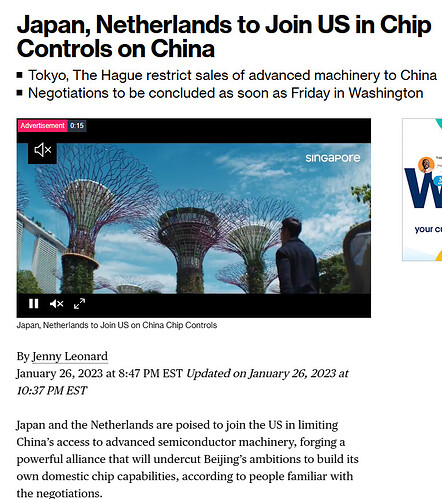据称,日本和荷兰将与美国一起限制中国获得先进的半导体机器,从而形成一个强大的联盟,削弱北京建立自己的国内芯片能力的野心。
这些人说,美国、荷兰和日本的官员最快将在美国时间周五就一套新的限制向中国公司供货的措施完成会谈,他们要求不透露姓名,因为会谈是私下的。
荷兰将扩大对ASML Holding NV的限制,这将阻止其出售至少部分所谓的深紫外光刻机,这些机器对制造某些类型的先进芯片至关重要,没有这些机器,可能就无法建立生产线。
日本将对尼康公司设定类似的限制。
拜登政府在10月份公布了一些限制措施,旨在限制中国自己制造先进半导体或从国外购买有助于军事和人工智能能力的尖端芯片的能力,这一联合努力扩大了这些限制。
美国设备制造商抱怨说,拜登政府的单边行动允许海外竞争对手继续在其产品的最大市场之一运作,并破坏了限制中国军事进步的目标。
中国已于12月向世界贸易组织提出争议,旨在推翻美国实施的出口管制。
ASML的首席执行官警告说,美国的运动可能会产生意想不到的后果。1月25日,首席执行官Peter Wennink表示,美国主导的针对中国的出口管制措施最终可能会推动北京在先进的芯片制造装备方面成功开发自己的技术。
Japan and the Netherlands are said to be joining the US in limiting China’s access to advanced semiconductor machinery, thereby forming a powerful alliance that will undercut Beijing’s ambitions to build its own domestic chip capabilities.
US, Dutch and Japanese officials are set to conclude talks as soon as Friday US time on a new set of limits to what can be supplied to Chinese companies, the people said, asking not to be named because the talks are private.
The Netherlands will expand restrictions on ASML Holding NV, which will prevent it from selling at least some of its so-called deep ultraviolet lithography machines, crucial to making some types of advanced chips and without which attempts to set up production lines may be impossible.
Japan will set similar limits on Nikon Corp.
The joint effort expands on restrictions the Biden administration unveiled in October that were aimed at curtailing China’s ability to manufacture its own advanced semiconductors or buy cutting-edge chips from abroad that would aid military and artificial-intelligence capabilities.
US equipment makers have complained that the unilateral action by the Biden administration allowed overseas competitors to continue to operate in one of the biggest markets for their products and undermined the aim of restricting China’s military advancements.
China has filed a dispute with the World Trade Organization in December aimed at overturning the US-imposed export controls.
ASML’s CEO has warned that the US campaign could have unintended consequences. On Jan. 25, CEO Peter Wennink said the US-led export control measures against China could eventually push Beijing to successfully develop its own technology in advanced chipmaking gear.
